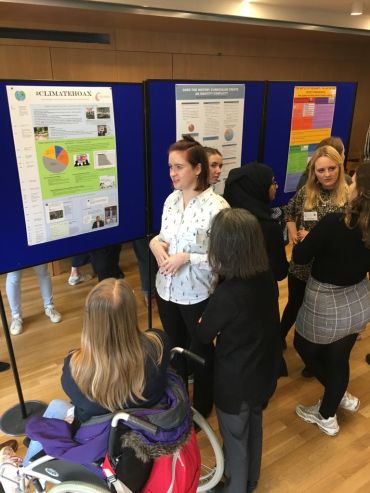Confronting the past through history education
Researchers in the Department of Education have worked with academics, young people, and educators to explore the challenge of tackling controversial histories in the classroom
“Teaching about issues where there is actual or perceived unfairness to people by individuals or groups in the past can be challenging,” says researcher Jason Todd.
“So called ‘controversial histories’ can be particularly difficult where past conflicts reflect present day tensions and communities may have different interpretations of events. As a result, many history teachers struggle to address sensitive topics and stick to well established themes which seem to be less contested.”
Todd and his colleagues Natasha Robinson and Heather Mann were undertaking academic research on teaching controversial histories. Together they wanted to bring international researchers into conversation with practitioners to explore some of the opportunities, dangers, and possible approaches to teaching such topics. The ‘Conflict and Identity’ conference, hosted at Lincoln College in October 2019, attracted diverse participants, including academics, politicians, genocide survivors, history teachers, and A-Level history students.
The conference showed a real appetite to teach and learn about histories of conflict but that teachers would welcome resources and guidance to support this.
 People looking at a poster on a posterboard.
People looking at a poster on a posterboard.“The conference was a brilliant example of knowledge exchange,” comments Todd. “It illustrated how the increasingly polarised public debate about issues such as identity and memories of war and colonialism, may make teachers wary of tackling these issues. And with the multiple demands being made on them it can be hard for teachers to keep up to date with the latest academic research to help build their knowledge and inform their practice.”
After the conference the researchers had planned to develop a workshop series to help address some of these gaps, but COVID pandemic social distancing made this impossible. Instead, the research team, working with the Historical Association (HA), developed a series of podcasts to support teacher’s professional development.
Each of the podcasts feature a conversation between an academic historian and a history educator talking about a period of controversial history. Podcasts cover the Northern Irish Troubles, the Holocaust, British Empire, Migration and Race. A further podcast looks at the teaching of controversial history in primary schools.
“The discussions were really fruitful,” comments Robinson. “In the Northern Ireland podcast for instance, the history educator warned of the danger of teaching a ‘Big Man’ history focused on community leaders, which would give students the impression that grass-roots community members were more polarised than they actually were.”
“The Holocaust is the only mandatory topic on the Key Stage Three history curriculum and as such is well resourced,” continues Mann. “But even here, the podcast explored how teaching approaches may fail to consider more sensitive issues, such as antisemitism including in Britain, in depth. We need to avoid presenting history as ‘binary’ with clear goodies and baddies, which isn’t helpful or accurate.”
Todd adds that: “The Race podcast enabled academics to share new terms and vocabulary emerging from more recent historical interpretation whilst the teacher educator offered insights into how they approach race in a diverse classroom.”
The podcasts build on the HA’s TEACH guidance report (Teaching Emotive and Controversial History 3-19), and the HA held a roundtable discussion based on the podcasts at their 2022 Conference (Bristol, 13-14 May) with further plans involving a revisiting of the TEACH guidance.
“The podcasts are a great resource and have huge potential to influence what happens in the classroom,” says Todd. “Controversial histories may be uncomfortable but it is vital that teachers are supported and enabled to teach them as they help students understand the reality of the past, as well as community experience and current tensions.
“We hope that the conference and podcasts will help give teachers and learners the tools and confidence to work with them in the classroom and encourage people to use them and share them with their peers.”
Research team: Jason Todd, Department of Education, Natasha Robinson, Department of Education, Heather Mann, Department of History
Funders: KE Seed Fund, Grand Union Doctoral Training Partnership, Lincoln College, Worcester Decolonisation Fund